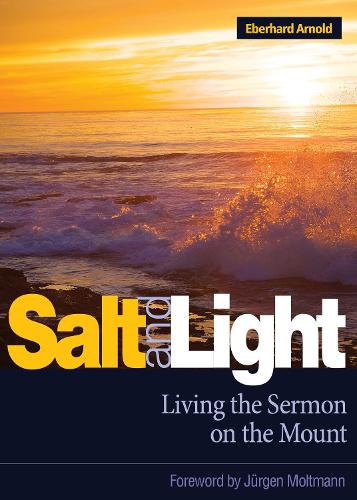
Salt and Light: Living the Sermon on the Mount
(Paperback)
Publishing Details
Salt and Light: Living the Sermon on the Mount
By (Author) Eberhard Arnold
Foreword by Jrgen Moltmann
Plough Publishing House
Plough Publishing House
27th May 2014
United States
Classifications
General
Non Fiction
Personal religious testimony and popular inspirational works
241.53
Physical Properties
Paperback
181
Width 127mm, Height 177mm, Spine 12mm
181g
Description
Salt and Light puts hands and feet to the demands of the Sermon on the Mount from the viewpoint of a writer who believes they are not only viable, but inescapable - something for us to live out today. In the Sermon on the Mount, Jesus puts aside his usual parables and speaks plainly in language anyone can understand. Yet for centuries countless scholars have dissected and analyzed these important words - and dismissed their demanding precepts as unrealistic or symbolic. Like Francis of Assisi and others, Arnold chose to live Jesus' words. He found new life by embracing the self-sacrificing demands of the Sermon on the Mount. This collection of talks and essays vividly describes a healing, energizing power for those burdened by the concerns of daily life. Arnold calls us to live for the Sermon's ultimate goal: the overturning of the prevailing order of injustice and building in its place a just, peaceable society motivated by love.
Reviews
Thomas Merton Salt and Light has all the simple, luminous, direct vision into things that I have come to associate with Eberhard Arnold. It moves me deeply. It is the kind of book that stirs to repentance and to renewal. I am very grateful for it. Jrgen Moltmann, from the Foreword Arnold's writings are a light of hope in an age which seems very dark. May they no longer remain 'hidden under a bushel,' but shine out to be heeded by many. Pitirim A. Sorokin, Harvard University An admirable, excellent book needed by a world which has turned against the Great Teaching of Jesus.
Author Bio
Writer and publisher, pastor and social revolutionary, organic farmer and maverick theologian, author Eberhard Arnold (1883-1935) defies easy categorization. Though largely unknown today, he was widely sought as a public speaker in his native Germany before and after World War I, and influenced thousands during his lifetime. In 1920, leaving a promising career and the privileges of upper-middle-class life in Berlin, he moved with his wife and children to Sannerz, a village where they founded a commune on the basis of New Testament ideals.
